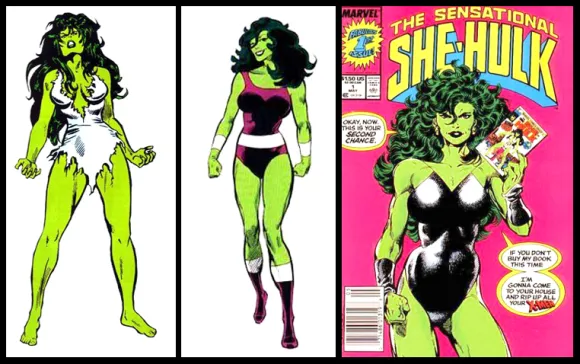Agent of S.T.Y.L.E. – Gamma Ray Glamor With She-Hulk: Part 1!
Agent of S.T.Y.L.E.

In 1962, comics introduced Dr. Robert Bruce Banner, a genius mutated by gamma radiation who frequently transformed into the Hulk. In 1980, writer Stan Lee and artist John Buscema introduced his cousin Jennifer Susan Walters, who earned the nickname “She-Hulk.” Ever since then, Jennifer has been rocking out in various comic book titles and teams, earning a loyal fanbase. There have also been a couple of other She-Hulks over the years, but a lot of people consider Jen as the one, true lady behind that name.
A new She-Hulk series has recently debuted from Marvel Comics, which I recommend you pick up [Editor’s Note: It’s great, and issue #4 came out yesterday!]. In the meantime, let’s chat about how Jennifer became Marvel’s glamorous gamma-powered green-skinned amazon!
SHE’S SAVAGE!

In The Savage She-Hulk #1, law enforcement and the military now know that Bruce Banner sometimes becomes the monstrous Hulk. He decides to seek out his cousin Jennifer, his best friend from childhood, whom he hasn’t seen in year. Jennifer is now a fine attorney, so Bruce hopes she can help him prove he isn’t responsible for the Hulk’s actions since his transformations alter his brain.

While the two cousins chat on the sidewalk, Jennifer is shot down by a criminal working for Nick Trask, a gangster she recently implicated in a murder. Jen suffers serious blood loss and there’s no phone nearby to call an ambulance, which might not arrive in time anyway. By sheer luck, there’s a local doctor’s home office down the street. Banner breaks in and uses the equipment to perform an emergency transfusion, remembering that he and Jennifer share the same blood type. He then calls an ambulance and leaves town once he knows Jennifer is safe, as the police are now closing in on him again.
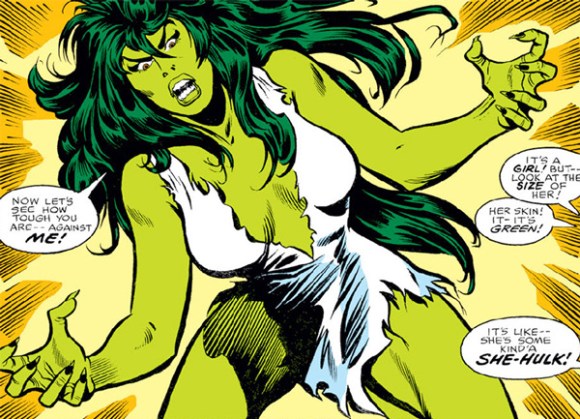
Jen recovers but feels strange. A later adrenaline rush reacts with the gamma-irradiated cells now in her bloodstream. She changes from a 5′ 10″ fair-skinned lady to a 6′ 7″ jade-skinned woman with amazing strength. Due to her height, muscles and skin-tone, a gangster she meets fearfully remarks, “It’s like . . . She’s some kind’a SHE-HULK!”
Along with having a faster, less painful transformation process, there was another key difference between Jennifer and Bruce. While the Hulk saw himself as a separate entity (except for times when Banner was in control), Jennifer didn’t have any change in identity. She was more aggressive at first, but still had her memories intact. She embraced the She-Hulk nickname and embarked on a double life as an attorney who sometimes transformed into an irritable superhero. As the stories went on, She-Hulk’s anger and quick temper were toned down. Now “Shulkie” was basically an uninhibited version of Jennifer Walters who felt like she was “throbbing with power!”
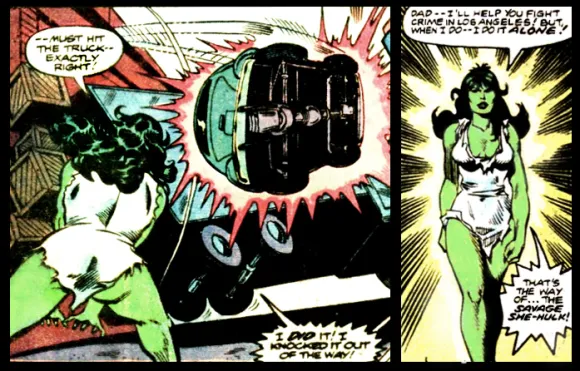
For the duration of the series The Savage She-Hulk, Jennifer never got a real costume. When Bruce transformed, he lost his shirt and ripped his trousers in areas. She-Hulk did the reverse. Jennifer’s trousers and shoes would be destroyed, while her many white shirts would tear but stay on. Inexplicably, despite the fact that Jennifer gained nearly a foot in height, all of her white shirts were JUST large and long enough that they still covered She-Hulk’s shame. A couple of times, Jen was in a white night gown when she wound up transforming, leading to an identical ripped white shirt/dress effect.
The ripped fabric look was definitely there to remind us this was a Hulk character and her title did call her “savage.” But it doesn’t really work. Jennifer was impulsive and a bit flighty as She-Hulk, but she wasn’t savage or brutish, despite what the public initially thought of her. Becoming She-Hulk wasn’t a release of her darker nature or repressed anger, it was Jennifer becoming a version of herself who could handle danger better. Also, the green skin and stature are enough to identify her as a Hulk character, we don’t need her to share her cousin’s shredded wardrobe.
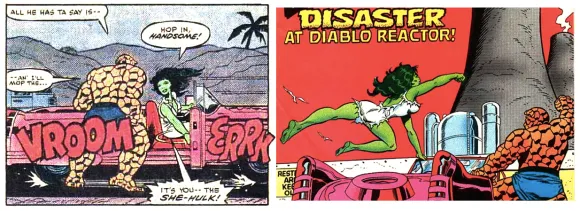
She-Hulk’s first series didn’t catch on, so it ended with issue #25 in 1982. But we weren’t done with the lady! She showed up later that year in Marvel Two-In-One #88. The series focused on Ben Grimm, the Thing, teaming up with a different character each story. In this issue, Jennifer was now rocking the public identity, walking around as She-Hulk because why not. She even picked up some commercial work as the green-skinned “glamazon.” Yet, for some reason, she still wore the shredded shirt/dress look. This issue, written by David Kraft and with art by Alan Kupperberg, Chic Stone and George Roussos, still called her the “savage She-Hulk” but she clearly no longer fit that description. Jennifer was played as a fun, humorous, confident hero. She spent half the adventure trying to corner the Thing into spending the weekend making out with her, not caring that he had a girlfriend. Soon after this story, she left Los Angeles and went off to hang out with a rather famous group of heroes living in New York City.
WORKS WELL WITH TEAMS
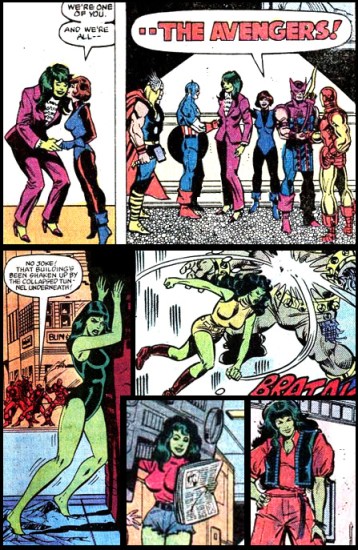
In Avengers #221, Jen joined the famous team of Earth’s mightiest heroes. Jennifer got rid of the ripped shirt look and wore a variety of outfits during her tenure on the team. She-Hulk had an unusual fashion sense at the time that was delightfully a product of the 70’s and early 80’s. Sometimes, she wore outfits designed by Janet Van Dyne AKA the Wasp, which is always a gamble considering the lady’s taste level seems to fluctuate with alarming frequency.
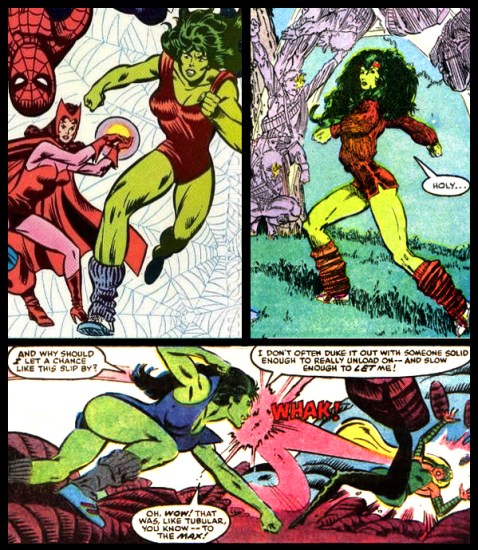
So because of Janet’s influence, She-Hulk finally got a costume. Finally. And guess what? It was the Wasp costume Janet was wearing at the time. Except that the black unitard worn underneath was ditched so She-Hulk could show off her jade skin. And it was given orange high-lights, which became the dominant color. And it had leg warmers. Leg warmers? Wait, I don’t care that this is the 1980’s. This isn’t a superhero uniform, Jen’s just late for the gym! It even looks just like an orange work-out outfit Jen wore during a Longshot mini-series years later. I should not have to stop and question “Is that a new version of the uniform or is she actually going to the gym this day?” Seriously, Jen could be on her way to Avengers Mansion or she might be preparing to star in a music video with Olivia Newton John. (If you don’t get that reference, it’s just proof that you’re a generation or two younger than me.)
Later on, Jen switched to a blue version which worked much better with her coloring. Because really, orange? She-Hulk looks terrible in orange. Yet to this day, people give her orange outfits on occasion! People, stop giving her leg warmers. Stop giving her orange outfits. Stop trying to make fetch happen!
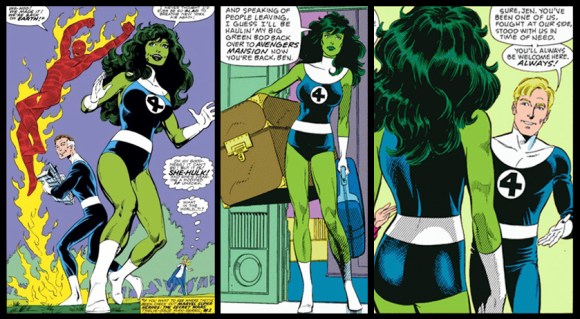
Now, in-between being a member of the Avengers and West Coast Avengers at different times, Jen also spent a short stint as a member of Marvel’s first family of superheroes. In Fantastic Four #265 (1984), written and drawn by John Byrne, Jen joined the Fantastic Four as a replacement for her buddy (and sometimes crush) Ben Grimm. The full details behind this were revealed months later in the pages of Marvel Super Heroes Secret Wars. Basically, Ben needed some me time but didn’t want his team/family to be left without someone who could smash concrete and juggle cars.
I should point out that at this time, the FF had changed to black and white outfits after wearing blue and black ones for years. The blue you see in the pictures are just highlights to show texture. The outfit definitely worked for Jen, showing she was part of the team but maintaining enough individuality to it that she still stood on her own.

When Jen left the FF, she returned and donned a simplified, purple version of her FF outfit. It’s generic and looks a little like a gym outfit, but then again Jen doesn’t really need a symbol or icon decorating her suit. You look at her face, skin and muscles and you know, “Oh, that’s She-Hulk.” So she can pull off wearing simple clothing. The color recalls the fact that her cousin often wore purple trousers until the late 1980s. It doesn’t have a lot of wow to it, but this uniform worked for Jen and inspired many similar styles throughout the years.
SENSATIONALLY SMASHING THE FOURTH WALL
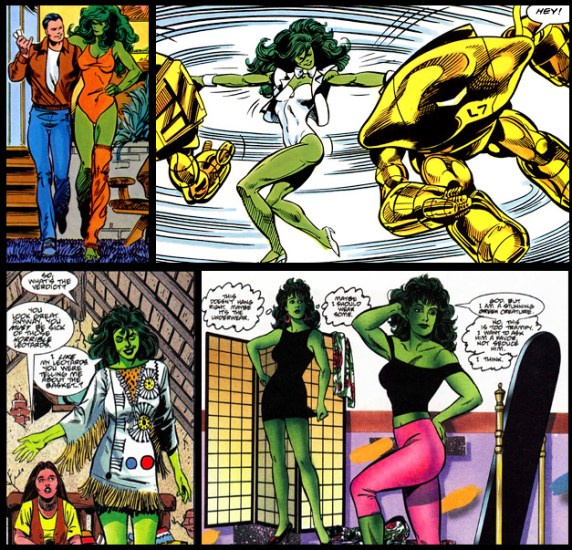
Jen got a new series again in 1989, entitled Sensational She-Hulk. Already experienced in handling the character from when she’d been a star in Fantastic Four, John Byrne started off as the writer/artist of this series. Unlike the previous She-Hulk series, this title didn’t delve into Jennifer as a character who led two lives. You see, for one thing, Jennifer had gone public about her She-Hulk identity around the same time that she joined the Avengers. Then, during her time with the Fantastic Four, a further exposure to radiation led to her being locked in her green-skinned body. Rather than lament that she was stuck as her superheroic self, Jennifer decided she preferred it, remarking that she hadn’t been fond of her shorter, physically weaker, slightly more inhibited self anyway. In Sensational She-Hulk, this created a rift between Jen and her father, who wondered at times if this was still the daughter he had raised.
It was decided that She-Hulk was totally aware that she was a character in a comic book. She and her supporting characters regularly addressed the audience and the creative team, commenting on plot twists and other characters. In fact, one character revealed that she had manipulated events to ensure she would be a supporting cast member of She-Hulk’s book because that meant comic book magic would keep her relatively young.
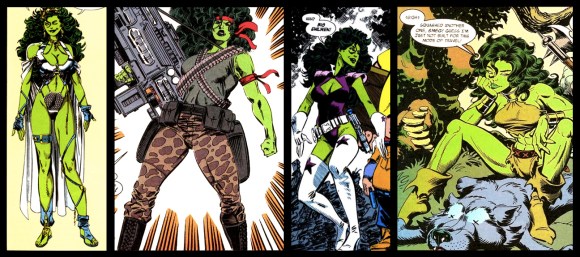
Sensational She-Hulk not only poked fun at comics, but at multiple action and adventure genres, sometimes dressing appropriately for the part. Some of these outfits were definitely fun and it was cute to see Jen referencing Rambo or ElfQuest, or fancying herself as a space sheriff. It helped enhance the idea that she wasn’t “savage” so much as playful and a geek herself, much like the reader.
It was a strange, new experience for Marvel readers. Many found it hilarious, though the fourth wall break scenes were occasionally criticized for taking up too much story time, glossing over plot holes and making stories more complicated than was needed. In issue #50, Byrne’s final as writer/artist of the series, Jennifer brought similar complaints to the Marvel offices herself. You see, it had been in an early Fantastic Four issue by Stan Lee and Jack Kirby that a version of Marvel Comics exists within the Marvel Universe, printing stories that are based on real superheroes, often with permission. This idea was later forgotten for the most part, but Byrne loved it and called back to it often.
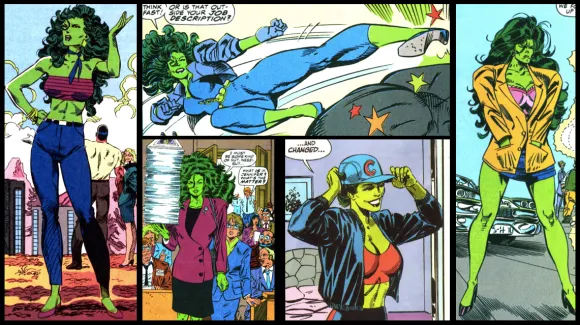
In Sensational She-Hulk #50, Jen learned that Byrne was out of the picture (this was actually his last issue) and spent the story looking through creative pitches from other creative teams who wanted to tackle her adventures. After approving the new creative team and wondering aloud a few times if anyone could truly replace Byrne, she then strangely found him locked in a closet. After a brief encounter, She-Hulk decided she was done with Byrne being in charge of her book and kicked him out a window. This basically marked the end of Jen’s fourth wall gimmick (for the most part). The idea of a Marvel comic with a protagonist who knew he was fictional was was later done to greater success with the character Deadpool.
Sensational She-Hulk had no stable fashion for Jen. She wore whatever she wanted to based on the situation and often took pride in how great she looked. Rather than rest on her laurels, she also made a regular practice of working out with specialized equipment so she would be as healthy and fit as possible.
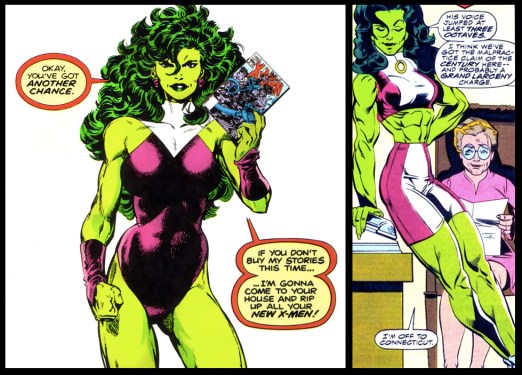
Purple was often used in her wardrobe, as was blue and sometimes orange hues. The fashion was very much late 80s in style, which makes sense since the book was released on the heels of the 1980’s. She-Hulk also occasionally wore variations of the purple superhero suit that she’d adopted when she rejoined the Avengers in the late 80’s.
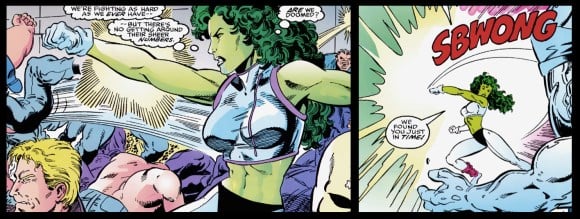
In the 1991 graphic novel The Vault: Death Trap, Jen sported this outfit during another mission with the Avengers. I am not a fan. This looks like a jazzercise workout outfit designed by the Jetsons. Leg warmers and odd Mickey Mouse gloves included! Moving on . . .
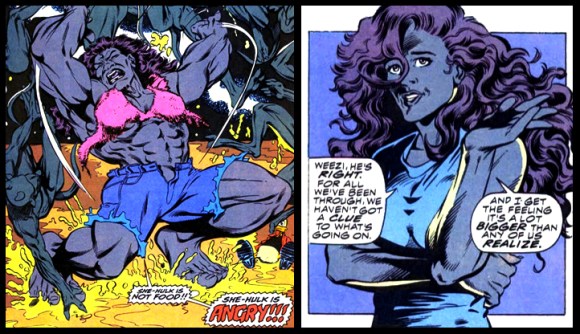
One fun (though now often forgotten) story involved She-Hulk going gray! During an adventure with Howard the Duck that started in Sensational She-Hulk #14, Jen passed through a strange prism that altered his body chemistry and radiation levels. It turned her back into her human self. Then in issue #15, she got angry and transformed into a gray, savage monster version of the She-Hulk. She then calmed down to her normal personality, but kept her traditional She-Hulk form with gray skin for a couple of issues. When it went away, she was back to being stuck as the green She-Hulk.
This skin color change was a reference to the Hulk’s original skin color. When Bruce Banner first debuted in comics, he became a gray-skinned monster because the idea was that the Hulk was his dark side. But coloring techniques of the time made it nearly impossible to keep the shade and tone of gray consistent. So starting with his second issue, the Hulk’s skin was colored green, a much easier color to handle. It was also at that time that he was given purple trousers, as purple and green handled well together and were typically colors given to monsters and villains in superhero comics.
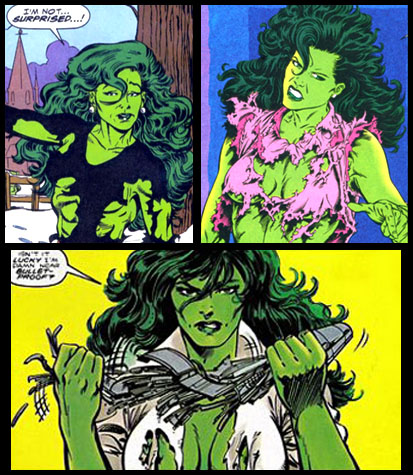
While many found Sensational She-Hulk entertaining, criticisms of fourth wall breaking aside, there were some who were concerned about how Jen was sexualized from time to time. The complaints weren’t usually against Jen’s behavior as a sexually confident woman who didn’t mind attention from guys she was interested in. That came under criticism was how often Jennifer wound up topless or in a ripped top or in sexualized situations that were said to be jokes or satire. One incident often referenced was when a corrupt SHIELD agent demanded that She-Hulk strip naked in front of him and his colleagues or else her boyfriend Wyatt Wingfoot would be killed before her eyes.
There was also one issue of the series that implied for a whole six pages that Jen was jump-roping while naked, only revealing on page 7 that she was actually wearing a bikini that couldn’t be seen through the rope’s motion lines. Even for a gag, six entire pages of a comic seem like a lot of space to joke about how silly such a scenario would be, especially when there are less than thirty pages to tell a story to the consumer and comics cost money.
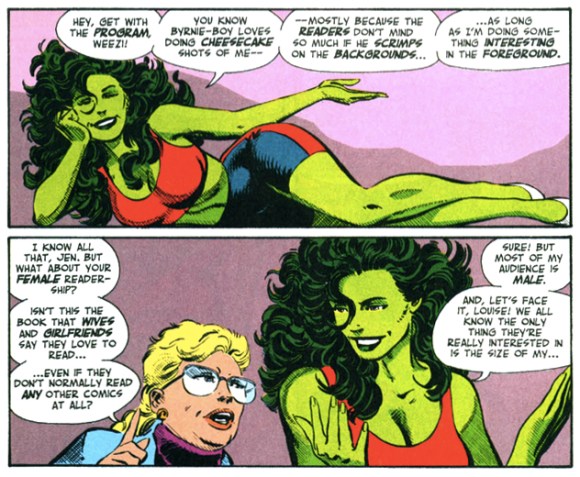
John Byrne himself addressed some of the criticism in Sensational She-Hulk #41. She-Hulk’s friend Weezi brings up the number of sexualized poses and situations in which She-Hulk winds up. Jen responds that readers don’t mind such things and adds that Byrne enjoys such scripting and drawing them. Weezi brings up how this may adversely affect the female readership, asking “isn’t this the book wives and girlfriends say they love to read . . . even if they don’t normally read any other comics at all?” Jen then dismisses this by saying that most of her audience is male anyway.
Although surely intended as a joke, it’s worth noting that we are disturbingly still having this kind of conversation and argument in comics today, where many people dismiss female readers and the idea of expanding comic book readership in favor of catering only to male readers already present, some of whom may not agree with how things are done anyway. Also notice that Weezi refers to the female readers as “wives and girlfriends.” There are a couple of problematic implications with that right there. Can’t you just imagine the female readers looking at She-Hulk comics over the shoulders of the boyfriends and husbands they must all have?
However, many readers defended that these were isolated incidents done with good intentions. The incident with the SHIELD agents was justified as a scene that was meant to be uncomfortable because Jen was forced into a bad situation by corrupt people. The other incidents of cheesecake and wardrobe malfunctions were defended as simply hilariously embarrassing situations that Jen could justifiably complain about and then overcome.
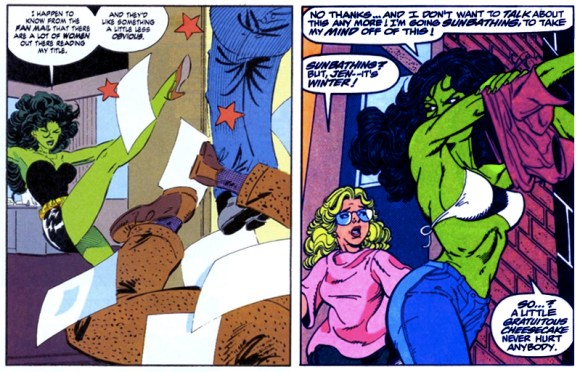
In his final issue in 1993, Byrne had She-Hulk react angrily when she saw a version of her comic that focused on her in a sexual way, this time pointing out herself that the book had female readers who deserved better product. The same issue also included a short story by the new creative team of Michael Eury, Todd Britton and Mike DeCarlo. This story involved She-Hulk discussing her new writer and artist, but then getting so frustrated that she decided to sunbathe, despite it being winter since “a little gratuitous cheesecake never hurt anyone.” She had just stripped down to her bikini when she was attacked by a villain. She barely defeated him and then was falling to her death before the Thing rescued her in time. Deciding she liked this new creative team, She-Hulk welcomed readers to a new era of “non-stop action.”
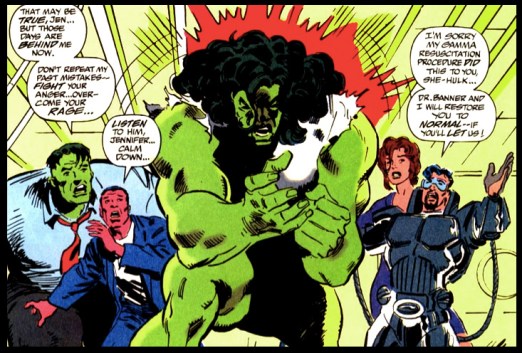
However, low sales meant the new non-stop action era didn’t last long. There was one so-so story where She-Hulk was manipulated into become savage again, this time keeping her jade skin while the volume dial went up on her rage, strength and size. This condition was quickly cured and Sensational She-Hulk was cancelled with issue #60 in 1994.
ROTATING TEAMS
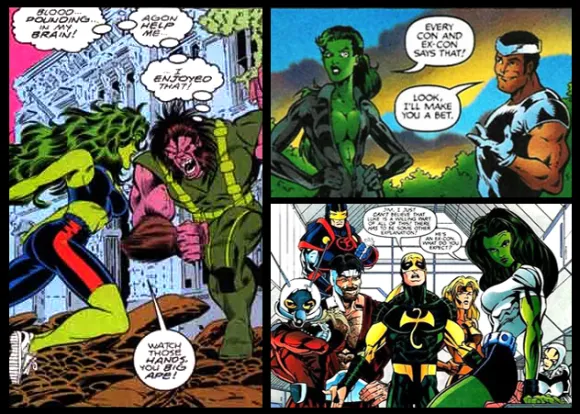
Following the cancellation of her series, She-Hulk spent a few issues rocking more gym clothes and starring as a supporting cast member of the short-lived mid-90’s Fantastic Four spin-off Fantastic Force. A year after that title was cancelled, Jen joined the new Heroes for Hire team. In that book, we first saw her wearing one of Catwoman’s costumes for some reason (NITPICKERS: I know it wasn’t literally Catwoman’s suit). Then she sported a white top, utility belt and black shorts. During her time with the Heroes for Hire, Jen also dated teammates Luke Cage.
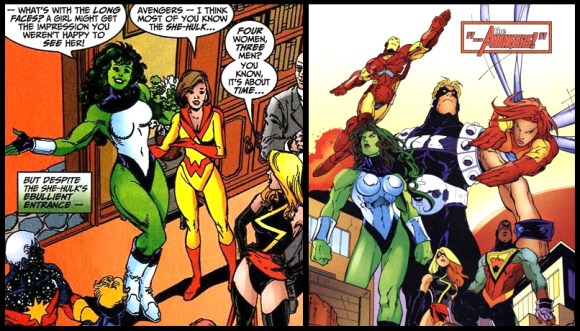
Heroes for Hire volume 1 ended in 1999. Meanwhile, Avengers relaunched in 1998 after the main team had spent a year trapped on another version of Earth. After leaving the Heroes for Hire group, Jen showed up at Avengers mansion again and rejoined the team for a while. She wore a new outfit that resembled her out 1980s purple uniform, but with the colors reversed. This is not a bad look at all. Yet with its lack of pockets, I’m forced to wonder . . . where does Jennifer keep her Avengers ID card?
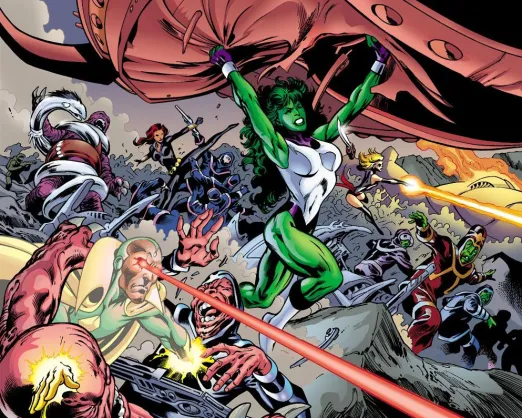
That was the last suit Jennifer wore during the 20th century. The 21st century has not only brought us new She-Hulk costumes so far, but also entirely new She-Hulks! We’ll discuss them and what Jen’s up to today in next week’s Agent of S.T.Y.L.E.!
Alan Sizzler Kistler (@SizzlerKistler) is an actor and freelance writer who sometimes moonlights as a comic book historian and professional geek consultant. He is the author of Doctor Who: A History. He really thinks there should be a She-Hulk TV show already, starring Angie Harmon. Get on that, Marvel Studios!
Are you following The Mary Sue on Twitter, Facebook, Tumblr, Pinterest, & Google +?
Have a tip we should know? [email protected]
